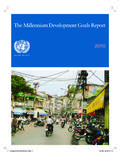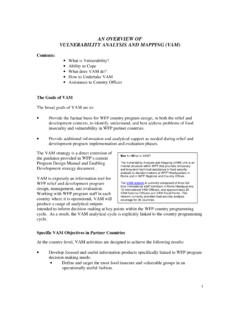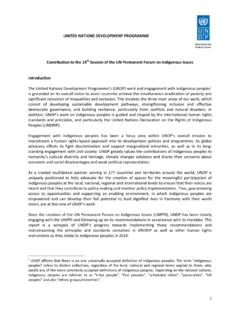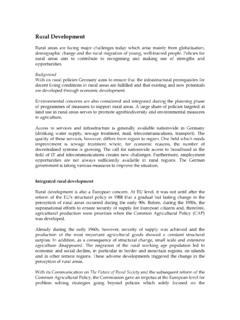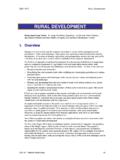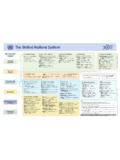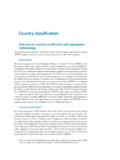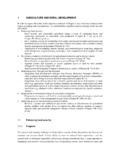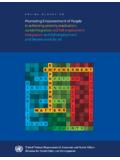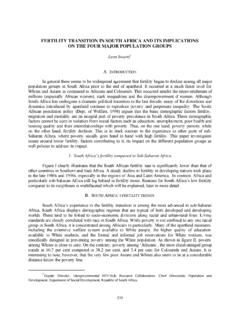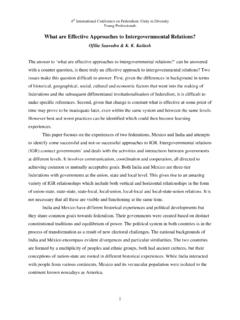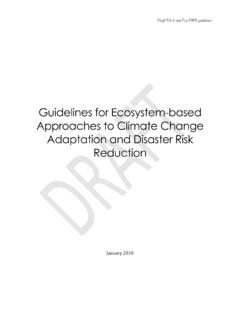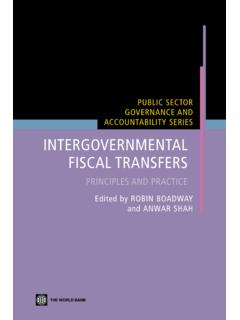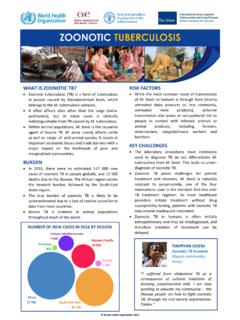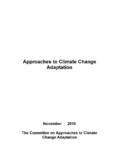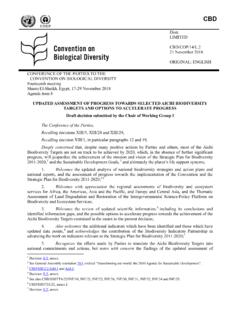Transcription of Committee for Development Policy
1 Committee for Development Policy Policy Note Global governance and global rules for Development in the post-2015 era United Nations June 2014. DESA. The Department of Economic and Social Affairs of the United Nations Secretariat is a vital interface between global policies in the economic, social and environmental spheres and national action. The Department works in three main interlinked areas: (i) it compiles, generates and analyses a wide range of economic, social and environmental data and information on which States Members of the United Nations draw to review common problems and to take stock of Policy options; (ii) it facilitates the negotiations of Member States in many intergovernmental bodies on joint courses of action to address ongoing or emerging global challenges.
2 And (iii) it advises interested Governments on the ways and means of translating Policy frameworks developed in United Nations conferences and summits into programmes at the country level and, through technical assistance, helps build national capacities. Note The designations employed and the presentation of the material in this publication do not imply the expression of any opinion whatsoever on the part of the Secretariat of the United Nations concerning the legal status of any country, territory, city or area or of its authorities, or concerning the delimitation of its frontiers or boundaries. The term country as used in the text also refers, as appropriate, to territories or areas.
3 The designations of country groups are intended solely for statistical or analytical convenience and do not necessarily express a judgment about the stage of Development reached by a particular country or area in the Development process. The views expressed in this publication are those of the Committee for Development Policy and do not necessarily reflect the opinions and policies of the United Nations. United Nations publication Sales No. ISBN 978-92-1-104689-2. eISBN 978-92-1-056769-5. Copyright @ United Nations, 2014. All rights reserved Global governance and global rules for Development in the post-2015 era iii Acknowledgements The present note reflects the collective views of the members of the Com- mittee for Development Policy .
4 The analysis and ideas that they contrib- uted during its preparation are greatly appreciated. Special thanks should be extended to Jos Antonio Alonso, Giovanni Andrea Cornia, Ana Luiza Cortez, Diane Elson, Sakiko Fukuda-Parr, Stephan Klasen, Keun Lee, Le- once Ndikumana, Jos Antonio Ocampo, Tea Petrin, Claudia Sheinbaum, Madhura Swaminahan and Dzodzi Tsikata, who prepared background notes and contributed other materials that served as important inputs for both the Committee 's deliberations and the present Policy Note. The pub- lication also relied on comments from other CDP members and the sub- stantive support from Ana Luiza Cortez, Hiroshi Kawamura and Namsuk Kim of the CDP Secretariat.
5 Iv Committee for Development Policy Foreword As we quickly approach the target year for achieving the Millennium De- velopment Goals (MDGs), Member States of the United Nations have initiated a process to identify approaches to Development strategies and goals for the post-2015 era. Guided by the principles identified in the out- come document of the 2012 United Nations Conference on Sustainable Development (Rio+20), progress has been made in the intergovernmental deliberations on defining a set of sustainable Development goals and on developing a financing strategy for sustainable Development . At the same time, the members of the Committee for Develop- ment Policy (CDP) an expert body of the Economic and Social Council composed of 24 members serving in their personal capacity have been providing intellectual leadership on the possible contours of the United Nations Development agenda for the post-2015 era.
6 Previous work of the Committee focused on the delineation of the national strategies necessary for achieving the internationally agreed Development goals. At its plena- ry meeting in 2014, the Committee shifted its attention to the interna- tional dimensions of the Development agenda. In particular, it considered how global governance and global rules could be strengthened to make them more conducive to Development in the post-2015 era. For the CDP, MDG 8 on the global partnership for Development addresses global gov- ernance in an incomplete way. In the Committee 's opinion, intergovern- mental cooperation is at the centre of the global partnership for develop- ment, and its role in the achievement of global Development goals goes beyond the resources and technical assistance it can provide.
7 Intergovern- mental cooperation is also required when global Policy decisions are taken and when global rules and norms are set, especially by multinational insti- tutions that are in need of reform. The Committee argues that strengthen- ing global governance and global rules is necessary in order to manage the increasing interdependence among countries more efficiently, to reduce ex- isting inequalities, and to guarantee the necessary Policy space for countries to pursue their own priorities within the limits given by interdependence. Existing proposals to reform the current global partnership are not truly comprehensive. The present Policy Note provides important in- put towards filling this gap.
8 An expanded version of the 2014 report of the Global governance and global rules for Development in the post-2015 era v Committee for Development Policy to the Economic and Social Council, the Note elaborates the arguments presented in that report and includes additional detailed information and analysis. It provides practical Policy recommendations on the way forward and on strengthening the role of the United Nations in achieving sustainable Development worldwide. I am confident that Member States, Development practitioners and the inter- national community at large will consider the findings contained in this Note an insightful contribution to their discussions on how to promote a sustainable world free of poverty and a life of dignity for all.
9 Wu Hongbo Under-Secretary-General for Economic and Social Affairs United Nations May 2014. vi Committee for Development Policy Summary intergovernmental cooperation is at the centre of the global partnership for Development . It has a vital role to play in the achievement of global devel- opment goals, in terms not only of the resources and technical assistance it can provide, but also in the areas of Policy decision-making and norm-set- ting. Global governance encompasses the totality of institutions, policies, norms, procedures and initiatives through which States and their citizens try to bring more predictability, stability and order to their responses to transnational challenges.
10 Effective global governance can only be achieved with effective international cooperation. Neither the existing proposals to strengthen global governance nor the global rules to support Development are fully satisfactory; they have also not received sufficient attention by the intergovernmental processes addressing the Development agenda for the post-2015 era. This Note presents comprehensive yet practical recommen- dations on how international cooperation, through its various institutions, arrangements and rules, could be reformed and strengthened to achieve and sustain Development gains beyond post-2015. It argues that international cooperation and the resulting gov- ernance mechanisms are not working well.
